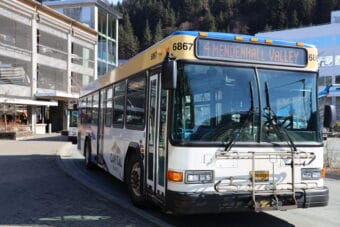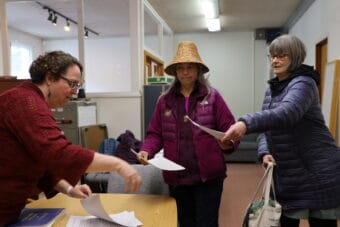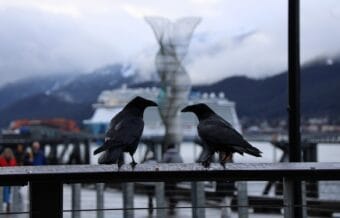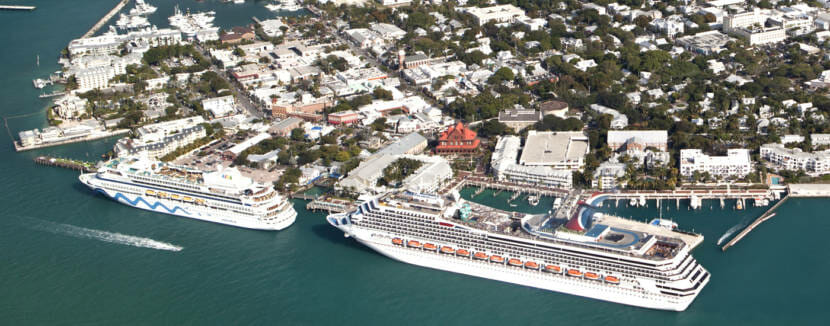
Voters in Key West, Florida decided last November to reduce cruise ship traffic in their town through amendments to the city’s charter. Sound familiar?
The lead activist behind a similar effort unveiled in Juneau last week said Key West was her inspiration.
Jeremy Hsieh spoke with longtime Key West resident and WLRN reporter Nancy Klingener about how it played out there. This interview has been edited for length and clarity.
Tell me a little about Key West.
Key West is a pretty small island. It’s about 3 by 5 miles. It’s densely populated, about 25,000 residents. And pre-pandemic, we got about 2 million tourists a year. … Cruise ships made up almost half of that. … So it can feel pretty crowded sometimes.
… I should also say, there was a study done by the cruise ship industry that showed that the cruise ship visitors were responsible for about 7% of the tourism spending in Key West.
So that’s how cruise ship business figures into Key West. Do you know how Key West figures into the cruise ship business?
It is a place where, if for some reason you can’t make a port of call somewhere else because of weather, or whatever, we will often receive ships — we’re conveniently located for some extremely major cruise ship ports: Port of Miami, Port Everglades which is in Fort Lauderdale and Port Canaveral, which is central Florida. You know, Key West is an easy stop, either coming or going from the Caribbean.
All right, so last November, folks in Key West voted on three ballot questions limiting cruise ship access to Key West. Where did these ballot questions come from?
They came after cruise ships stopped sailing in March of last year, 2020.
It wasn’t just the cruise ships that stopped sailing. The city shut down all hotels and vacation rentals. And the county even put a checkpoint up at top of island chain. The Keys are an archipelago that come off the bottom of the state of Florida, and they put up checkpoints at top of the Keys — there’s two roads that you can get in here on. … So basically, we shut down all tourism for the months of April and May of last year.
And so we had this real pause in what had been normal life in the Keys. And there was a lot of discussion … about, maybe we should kind of take this as an opportunity to think about what we’re doing. And a group of locals here in Key West and the lower Keys started crafting a proposal to really change and cut way back on cruise ship visitation.
Why single out the cruise ships versus, you know, independent travelers or day-trippers, that kind of thing?
Yeah, there were really two issues that they brought up. One of which was the possibility of an infection breakout. Remember, during the early pandemic, cruise ships were a big focus of that. And the reason the Keys shut themselves off from tourism is ‘cause we also have very limited hospital capacity. There’s three hospitals along this 100-mile island chain. One for Key West, which is the biggest population center. And I believe we had nine ICU beds. So early in the pandemic, people were like, we don’t have capacity to deal with a real breakout.
And cruise ships, you know, not just with coronavirus, but I’m sure you know with the norovirus outbreaks in the past, have been a source of disease outbreaks. So there was a lot of concern that Key West couldn’t handle that. And it wasn’t worth that risk to the local population and the greater tourism economy for what the cruise ships bring. … So their argument was, they are half the visitors, and they’re only providing 7% of our money.
Their other argument was environmental, that the ships stir up sediment on their way in and out of the harbor, and that this damages the reef and the fishing right off Key West.
You know, as it progressed, did it stay pretty grassroots? Or was there outside moneyed interests coming in and trying to influence how things went?
There was definitely financial support for initiatives, came from locals, or people with an interest, you know, snowbirds, in Key West.
The campaign against these initiatives, it was kind of funny. The local chamber of commerce came out against two out of three ballot questions. … Some local businesses that rely on cruise ships definitely campaigned against it.
But we also in Key West started getting flyers that had these scary messages about how your taxes were gonna be raised and also that you would basically be defunding the police if these referendums passed, ‘cause they said that we would lose all this tax revenue. And there was like, a picture of this woman walking down the street, and a guy in a scary black mask behind her. And those were from this registered group that the Miami Herald did a big investigation and called it “dark money” and managed to trace it back to the cruise industry.
And so what happened in the election in November?
The two questions that would limit the number of passengers and the capacity of ships, both of those passed by more than 60%. And the one about prioritizing the cleaner, safer ships, that one passed by more than 80%.
Just, the feeling in town, is it pretty divisive?
Yeah, it’s pretty divisive, absolutely. And it has been a long time, the issue of cruise ships. I guess the feeling is, it’s an awful lot of people that don’t provide a huge benefit. Or provide a big benefit, but to only some businesses. And that it actually hurts the bigger business of, you know, the hotels. … Because they feel like, if downtown is really crowded, then the people who are paying those huge high room rates aren’t going to want to hang out there, eat at the restaurants, shop at the stores. Stuff like that.
And we charge very high room rates. … Our February average daily rate was $370 and the preliminary for March was $436. It’s really high. Around Easter, I was talking to some friends who run a hotel, and the last minute bookings, I mean, it was four figures for a lot of the big resorts and stuff.
Do you have anything else you want to add about it that I didn’t ask?
There’s been this tension between what you would call “mass tourism” and the higher end resort tourism in Key West, for as long as I’ve been here, you know, 30 years. … That this is an elitist move, that the people who support this don’t want, you know, poor people, essentially, coming to Key West. You know, these are people who obviously would never be able to afford a $436 a night hotel room. You know, it’s a terrible thing to say, you can’t come here, unless you can afford that. And cruise ships are really where that comes to a head.
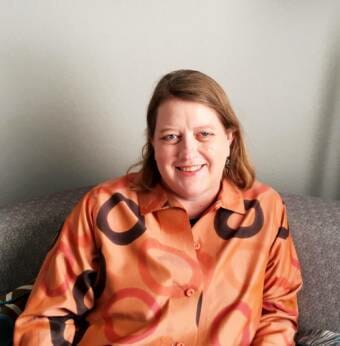
You can find Nancy Klingener’s coverage of Key West’s cruise ship limits and Florida lawmakers’ effort to overturn them at WLRN.org. And here’s a link to the Miami Herald’s investigation into the industry-funded disinformation campaign against Key West’s cruise ship limits that she mentioned.

